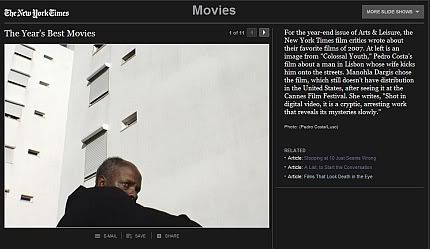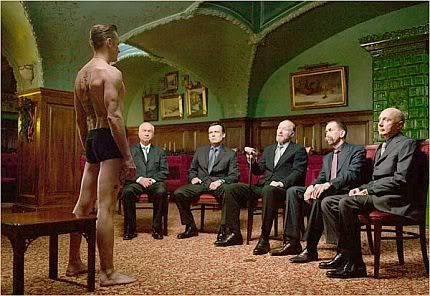Lista de películas destacadas en el 2008 NYT
FILM |
| A List, to Start the Conversation By MANOHLA DARGIS Published: December 23, 2007 |
|
|
| THE whole point of a Top 10 list, a friend recently scolded me, is to number them. (I was declining to do so.) My friend was wrong, but only because Top 10 lists are artificial exercises, assertions of critical ego, capricious and necessarily imperfect. (I have a suspicion that the sacred 10 is meant to suggest biblical certainty, as if critics are merely worldly vessels for some divine wisdom.) More than anything they are a public ritual, which is their most valuable function. I tell you what I liked, and you either agree with my list (which flatters us both) or denounce it (which flatters you). It's a perfect circle. Mostly, these lists give me an excuse to remind readers of good and great films that they may have missed. (That's the evangelist speaking, not Moses.) They allow me to revisit favorites, sift through the year and share a few thoughts that I didn't or couldn't get into print earlier, along with fragments, digressions and a few jabs. In some respects the actual list is the least of it, which is why I'll dispatch with it now with minor annotation and, save for the first two titles, without numbers. Paul Thomas Anderson's "There Will Be Blood," which I will write about in detail when it opens on Wednesday, and David Fincher's "Zodiac," which I wrote about when it was released in March, together constitute my 1 through 10. These aren't necessarily the year's best (impossible to determine given the glut of films), just the two that matter most to me, that dug in the deepest and rearranged my own givens. They made me feel like the woman in the start of Orson Welles's film "Touch of Evil" who says, "I've got this ticking noise in my head," just before she's blown to smithereens by a time bomb. I'm still intact (more or less), but these films shook up my world in the best possible way. My other favorite releases of the year are: |
| |
| Each of these was reviewed in this paper, and most are now available on DVD or soon will be. |
| This year'sCannes Film Festival supplied a remarkable bounty that included Hou Hsiao-hsien's "Flight of the Red Balloon," Gus Van Sant's "Paranoid Park," Catherine Breillat's "Last Mistress" and Carlos Reygadas's "Silent Light," all of which are scheduled to open next year. You're probably wise to "The Bourne Ultimatum," so instead let me share a few words about "Colossal Youth," from the Portuguese filmmaker Pedro Costa. Obscure in more ways than one, this movie has not been picked up by an American distributor, making it hard for even intrepid filmgoers to see. Shot in digital video, it is a cryptic, arresting work that reveals its mysteries slowly. With their deliberate movements and long silences, Mr. Costa's cast nonprofessionals culled from a Lisbon slum seem as monumental as marble, a heaviness that all but stops the flow of the movie and forces your attention directly on them. You really watch this movie or you flee. If it makes it to DVD, I promise to let you know. "The Bourne Ultimatum" and "Colossal Youth" (now there's a double bill) could not be more different: they're limpid/opaque, frantic/composed, global/local, star-driven/real-peopled. Neither looks like the other or like anything else out this year. Each brings you into worlds through different formal means. "The Bourne Ultimatum" fragments the image, thereby mirroring the fragmented nature of its title character, and accelerates the pace, creating a shattered, violently trembling world that forces you to pay close attention or risk missing something, like the sight of Bourne jumping from a roof and through a window. "Colossal Youth," by contrast, allows the world to cohere (almost congeal) around its characters, and it slows down its pace so drastically that unless you adapt your rhythms to it, you will never find a way in. These films exemplify the perceptual extremes of my moviegoing year; somewhere in the middle is the Norwegian film "Reprise," from the young director Joachim Trier. A coolly funny, touching, exhilaratingly intelligent mediation on identity and friendship, "Reprise" has a self-conscious visual style (jump cuts, freeze frames) that perfectly expresses the worldview of its two self-conscious lead characters, first-time novelists and increasingly alienated best friends. The film has bumped around the international festival circuit for the last year and a half, scooping up awards and love, though not until recently did it land an American distributor. (Look for it next year.) Enthusiastic reviews, intelligent filmmaking, even hot sex are no longer automatically enough to persuade a distributor to jump. The problem is that the art-house audience that supported the French New Wave filmmakers to whom "Reprise" owes an obvious debt can no longer be counted on to fill theater seats. Or maybe it's overwhelmed. For a variety of reasons, including the glut of releases, movies are now whisked on and off theater screens so fast that it's hard for the audience to discover them, much less build a popular film-going culture. In 1984 Jim Jarmusch's "Stranger Than Paradise" hung around in theaters long enough for people to learn how to spell his name. These days too many cool movies are just passing through on the way to your Netflix queue. |
|
 Click over image, or here, to see the Slideshow. "The Year's Best Movies" |
| I don't think anyone knows what the solution is, but this year IFC Entertainment hit its stride with its First Take series. Twice a month the company simultaneously opens a film theatrically, including at the IFC Center in the West Village, and releases it via video-on-demand on cable television. If the film does well in theaters, it might go wider than initially planned. IFC isn't the first company to go the day-and-date route, but so far it's letting people with great taste buy films during a multifestival shopping spree, they picked up "The Flight of the Red Balloon," "The Last Mistress" and "Paranoid Park" so, until someone comes up with a better idea, more power to them. IFC also had the smarts to snap up the Romanian film "4 Months, 3 Weeks and 2 Days" at Cannes before it won the Palme d'Or. (It had a brief Oscar qualifying run in Los Angeles and reopens in January.) Directed by Cristian Mungiu, this is one of those putatively dark, difficult movies that industry mouthpieces try to use as proof that critics are out of touch with the audience when it is actually the audience that is out of touch with good movies. Americans consume a lot of garbage, but that may be because they don't have real choices: 16 of the top box-office earners last weekend some good, almost all from big studios monopolized 33,353 of the country's 38,415 screens. The remaining 78 releases duked it out on the leftover screens. I doubt that most moviegoers would prefer the relentlessly honest "4 Months, 3 Weeks and 2 Days," which involves a young woman seeking an illegal abortion, over "Juno," an ingratiating comedy about a teenager who carries her pregnancy to term. But I wish they had the choice. "4 Months" is aesthetically bracing, but "Juno" has easy laughs, dodges abortion quicker than a presidential candidate and provides a supremely artful male fantasy. Like "Knocked Up," it pivots on a fertile hottie who has sex without protection and, after a little emotional messiness (and no scary diseases), delivers one baby and adopts a second, namely the man-child who (also) misplaced the Trojans. Both comedies superficially recall the male wish-fulfillment fantasies of "Sideways," but without the lacerating adult self-awareness. This year's baby boom more bellies popped in "Waitress," " Margot at the Wedding," " A Mighty Heart," " Bella" and even the latest " Shrek" may be purely coincidental or cyclical or just evidence of the limits of imagination. But because this year our movies also marched off to war in " Redacted," " Rendition," " Lions for Lambs" and " In the Valley of Elah," among other titles I can't help but think we have embarked on a symbolic flashback to the 1940s and 1950s. In the way-back machine of the movies, we are simultaneously returned to the glories, agonies and clichés of cinematic war and to atavistic gendered stereotypes, embodied this year by beatific, inevitable maternity. Filmmakers may be shooting blanks on the war front, but back home they're getting plenty of action. |



0 Comments:
Post a Comment
Subscribe to Post Comments [Atom]
<< Home